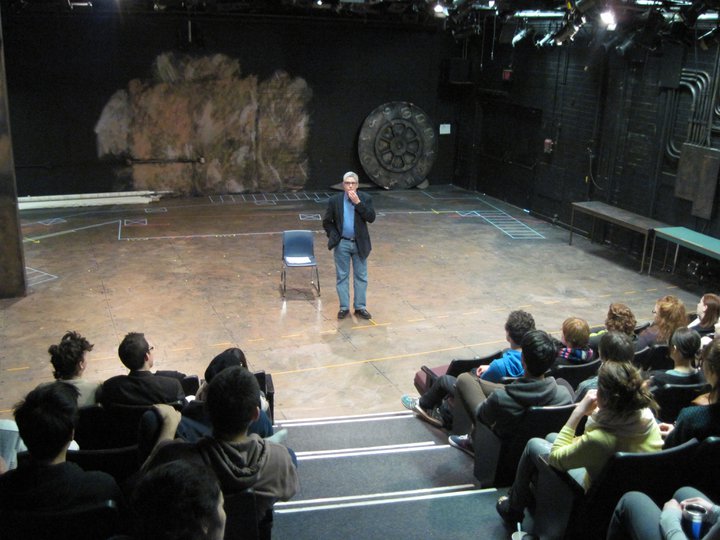Synopsis
In a country where playwriting and the teaching of playwriting are banned by law, a young woman comes to her doctor, who has a secret side career as a playwright, for a clandestine lesson in this forbidden art form. The Doctor begins with the fact that the characters in a play don’t know they’re in a play. Then, inadvertently illustrating this point, he fails to notice that all the things he talks about in terms of play development begin to happen as he mentions them. They include such plot developments as a secret infatuation, a suspicious husband, and a threat from their repressive government. But it all concludes with what the Doctor says, in the last line, he truly believes in: plot twists and happy endings.
Production History
The Illegal Playwriting Class was first presented under the title “So You Want to Write a Play”, by Alberta Theatre Projects in January, 1987. It has had numerous productions since then and has been published in the anthology Instant Applause, Vol. II, by Blizzard Publishing, 1996.
Requirements
2 M, 1 F, and one offstage female voice. One setting. A one-act play of about 30 minutes.
Excerpt
The DOCTOR is well into his lesson in playwriting, but he’s had two repeated distractions. The pleasant distraction is the fact that MADAM, the young woman, is wearing a veil, and keeps lifting the veil to eat the chocolates that DOCTOR has offered her. The unpleasant distraction is that the intercom has buzzed several times now, with news that there is a young man urgently wanting to come in and see the DOCTOR.
DOCTOR: Where was I? Yes. Plot and character. Plot, the lifted veil that reveals the naked mouth of Character biting into the sweet juice of Theme – but I digress. Plot defines character, character makes up more plot – (Intercom buzzes, and he switches it off.) And sometimes plot interferes from the outside, and the character is defined by how he tries to shut it out.
MADAME: To shut it out? Why?
DOCTOR: Because characters don’t want a plot! They want to go on with their ordinary, boring lives without complications. For instance, they may not want to fall in love, but you and I force them to, because, paradoxically, it’s the troubles we give them that turn them into interesting people. Through the risks they choose to take. Let me give you an example. (Reaches into safe, takes out a couple of typewritten, bound scripts, gives her a copy.) This is a play of mine.
MADAME: Doctor! Are you sure you want to do this? You know what this means!
DOCTOR: I’m willing to take the risk. Turn to page thirty-seven. We’re going to read a scene together, which demonstrates what I mean. I play the Artist Who Is Going Blind; you play the Lady Ophthalmologist. (Reads:) “My darling, until now we have been doctor and patient. But we can no longer maintain this guise.”
MADAME: “No. It’s true. I know that now.”
DOCTOR: “We must be lovers – lovers in secret.”
MADAME: “Oh, you don’t know how long I have been waiting to hear you say this.”
DOCTOR: “No longer than have I.”
MADAME: “I have loved you since the first moment I looked into your eye.”
DOCTOR: “And I you!”
MADAME: “But I have a terrible secret to impart. You know nothing of my past.”
DOCTOR: “‘Tis your present that is gift enough for me!” (He tries to embrace her in earnest. She pulls away and whacks at him with the script.)
MADAME: Doctor! Stop that!
DOCTOR: Madame, this is more than just a play! I thought I was in love with your throat. I thought it was merely physical. But now I know better. It’s because your voice vibrates with intelligence and, yes, passion.
MADAME: I’m going.
DOCTOR: No.
MADAME: First I came to you with tonsillitis. Now I come to you with the equally painful need to write a play. And both times you’ve tried to take advantage of me. I’m going.
DOCTOR: Madame! Please! No! (The intercom buzzes. He switches it on.) Not now! (NURSE/RECEPTIONIST’S VOICE screams over the intercom. DOCTOR does not notice, switches it off.) Madame, you don’t understand! It’s because the drama walks that tightrope between realism and fantasy!
MADAME: The lesson is over!
DOCTOR: This isn’t the lesson, this is the apology! That balance between realism and fantasy, it affects the brain. I forget where one ends and one begins. I’m sorry. Please take your seat. I won’t offend you again. I promise.
MADAME: Very well. Though I know perfectly well that it wasn’t just an apology. It was also part of the lesson.
DOCTOR: Well, why not, that’s the beauty of playwriting, you get to use everything.
*****
